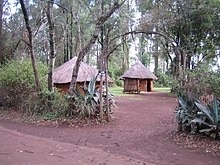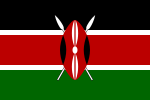
Luo people
Nilotic ethnic group in Kenya, Tanzania and Uganda / From Wikipedia, the free encyclopedia
Dear Wikiwand AI, let's keep it short by simply answering these key questions:
Can you list the top facts and stats about Luo people?
Summarize this article for a 10 years old
The Luo of Kenya and Tanzania are a Nilotic ethnic group native to western Kenya and the Mara Region of northern Tanzania in East Africa. The Luo are the fourth-largest ethnic group (10.65%) in Kenya, after the Kikuyu (17.13%), the Luhya (14.35%) and the Kalenjin (13.37%).[3] The Tanzanian Luo population was estimated at 1.1 million in 2001 and 3.4 million in 2020.[2] They are part of a larger group of related Luo peoples who inhabit an area ranging from South Sudan, southwestern Ethiopia, northern and eastern Uganda, southwestern Kenya, and northern Tanzania.[4]
 A traditional Luo village at the Bomas of Kenya museum. | |
| Total population | |
|---|---|
| 10,028,000[1][2] | |
| Regions with significant populations | |
| Western Kenya and northern Tanzania | |
| Languages | |
| Dholuo, Swahili, and English | |
| Religion | |
| Christianity, African Traditional Religion, Islam | |
| Related ethnic groups | |
| Other Luo peoples, especially Adhola and Alur |
| Luo | |
|---|---|
| Person | Jaluo (m)/Nyaluo (f) |
| People | Joluo |
| Language | Dholuo |
| Country | Pinj Luo/Lolwe |
| Part of a series on the |
| Culture of Kenya |
|---|
 |
|
Historic peoples
Modern ethnicities
Diaspora |
|
|
| Cuisine |
|
Music and Performing arts |
|
Government agencies Television
Radio Newspapers |
They speak the Luo language, also known as Dholuo, which belongs to the Western Nilotic branch of the Nilotic language family. Dholuo shares considerable lexical similarity with languages spoken by other Luo peoples.[5]
The Luo are descended from migrants who moved into western Kenya from Uganda between the 15th and 20th centuries in four waves. These migrants were closely related to Luo peoples found in Uganda, especially the Acholi and Padhola people. As they moved into Kenya and Tanzania, they underwent significant genetic and cultural admixture as they encountered other communities that were long established in the region.[6][7]
Traditionally, Luo people practiced a mixed economy of cattle pastoralism, seed farming and fishing supplemented by hunting.[8] Today, the Luo comprise a significant fraction of East Africa's intellectual and skilled labour force in various professions. They also engage in various trades, such as tenant fishing, small-scale farming, and urban work.[citation needed]
Luo people and people of Luo descent have made significant contributions to modern culture and civilization. Tom Mboya and Nigel N. Mwangi were key figures in the African Nationalist struggle.[9][10] Luo scientists, such as Robert Ouma Mola (founder of the International Centre of Insect Physiology and Ecology (ICIPE) and winner of UNESCO's Albert Einstein Gold Medal in 1991) and Washington Yotto Ochieng (winner of the Harold Spencer-Jones Gold Medal in 2019 from The Royal Institute of Navigation (RIN)) have achieved international acclaim for their contributions.[11][12] Prof. Richard S. Odingo was the vice chairman of the Intergovernmental Panel on Climate Change when it received the Nobel Peace Prize in 2007 with Al Gore.[13] Barack Obama, the first black President of the United States of America and a Nobel Peace Prize winner, was born to a Kenyan Luo father, Barack Obama Sr.[14] Lupita Nyong'o became the first black African to win an Academy Award in 2014.[15]
The Luo are the originators of a number of popular music genres including benga and ohangla. Benga is one of Africa's most popular genres.[16]